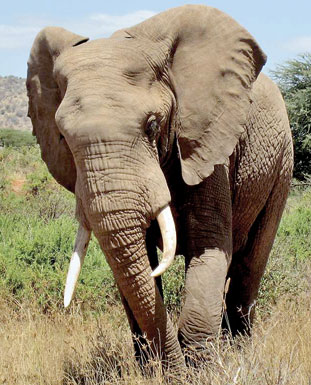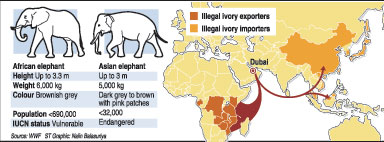News
Blood ivory is not for showcasing
View(s):Conservationists and Buddhist monks are against the release of confiscated elephant tusks or their display in temples, writes Malaka Rodrigo
Releasing a cargo of confiscated ivory would only create a demand for more ivory, and this would trigger a surge in the poaching of Sri Lankan tuskers, warn animal lovers.
Environmentalists and conservationists protested on hearing that a consignment of 359 African Elephant tusks seized by the Sri Lanka Customs was to be released last week. Last month, the Presidential Secretariat ordered the Customs to release the ivory for distribution among Buddhist temples.

A majestic sight: Just four days before this African elephant was killed for its tusks. Pic courtesy Ike Leonard
Buddhist groups say the ivory was bought with blood money paid to kill African Elephants for profit, and that the tainted ivory has no place in Buddhist temples or places of veneration. Prominent Buddhist monk and activist, Ven. Athuraliye Rathana Thera of the Jathika Hela Urumaya, says displaying the ivory in temples would go against the principles of Buddhism, which preached compassion for all living things. The Thera recalled the way tuskers were decimated in colonial times.
“To give the confiscated ivory to temples would be the same as giving any other confiscated goods. This blood ivory is ‘hora badu’ [stolen goods],” said the Ven. Galagodatthe Gnanasara Thera, secretary to the Bodu Bala Sena, a Buddhist activist organisation.
Releasing the stock of contraband ivory would only raise the demand for ivory, said Professor Devake Weerakoon, speaking at a press conference organised by the Federation of Environmental Organizations (FEO) and other environment groups. The African Elephant is being targeted by poachers and the best way to reduce the killing is to prevent the demand from going up, said the professor, who is a member of the International Species Survival Commission for Asian Elephants. The commission comes under the International Union for Conservation of Nature.
Trading in ivory was banned internationally in 1989. Prof. Weerakoon feared the showcasing of African Elephant ivory would put Sri Lankas few remaining tuskers in the wild at risk.
The display of valuable ivory in temples would only encourage looters who were plundering the country for Buddhist artifacts and treasures, said Thilak Kariyawasam of the Environmental Conservation Trust, while Sajeewa Chamikara, also of the trust, said giving ivory to temples was as unacceptable as giving elephant flesh to temples.
Conservationist Rukshan Jayawardane said publicly destroying the stock of ivory would send a strong international message to those who promoted wildlife crime.
2012 peak year for ivory smuggling
While the human-elephant conflict is the main threat to the Asian Elephant, poaching for ivory is the main threat to the African Elephant. Both the male and female African Elephant are blessed – or cursed – with tusks.
Killing elephants for ivory is on the rise, says Dr. Richard Thomas, communications co-ordinator for TRAFFIC, the international conservation organisation. Last year, 2012, was among the five worst years on record for ivory smuggling worldwide, Dr. Thomas said.
In an exclusive interview with the Sunday Times, Dr. Thomas said TRAFFIC would not be in favour of releasing the ivory seized by Sri Lanka Customs. The ivory could “leak” back into the international illegal ivory trade and stimulate further trafficking and concomitant poaching of elephants.

TRAFFIC recommends that any seized ivory be audited and held in secure, government-owned and managed ivory stockpiles to ensure the ivory would not re-enter the illegal trade.
Save-the-Elephants (STE), a Kenya-based conservation organisation, says the number of elephants illegally killed has doubled in the last three years.
Leading African Elephant conservationist Dr. Douglas Hamilton said, “We faced this threat 30 years ago and we know that the situation can be controlled and reversed if the appetite for ivory is reduced. There needs to be united action from concerned individuals, NGOs and governments to reduce the demand for ivory.”
Follow @timesonlinelk
comments powered by Disqus


















